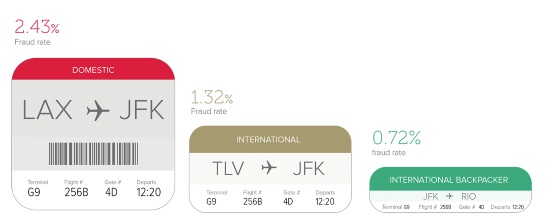
Stop declining these travellers’ orders!
By cameron in Uncategorized
Airlines and online travel agencies (OTAs) invest considerable funds and go to great lengths in an effort to prevent online fraud and the ensuing losses.
But while trying to avoid chargebacks, many travel merchants impose strict rules and filters that block not only fraud attempts, but also good customers.
NB: This is a viewpoint by Ephraim Rinsky at Riskified.
In the highly competitive online travel market, wrongly declining a good order and failing to provide a great online experience can mean losing not only the deal, but also all of the customer’s future business.
International backpackers are a key consumer segment that airlines and OTAs falsely decline on a regular basis.
In this article, I explain why online purchases by global travelers between the ages of 18-25 tend to set off red flags in fraud detection systems, and share stats showing how safe these customers actually are.
Backpackers fly solo, seek last minute deals
Online travel merchants know that both last minute bookings and single ticket purchases are high-risk. But high-risk is relative: over 95% of last minute, single ticket orders are valid.
And when we dug deeper into these orders, we discovered that those which matched the profile of international backpackers are an even safer subcategory.

First, irrespective of time to flight, if the solo traveler’s age is 18-25, the likelihood of her order being fraudulent is just under one percent, compared to 2.13% for solo travelers of all other ages.
Furthermore, when we envision a young adult traveler, it isn’t a stretch to imagine her buying travel tickets last minute – due either to spontaneity or simply because students are more sensitive to price fluctuations and only travel when they can find good prices.
The data bears this out: less than 3% of last minute ticket purchases by customers between the ages of 18 and 25 are fraudulent, a significantly lower rate of fraud than in last minute tickets purchases by travelers of other age groups.
International is… safer?
While fraudsters tend to target expensive goods that can be resold for steep prices, this is not the case in online travel. Riskified’s data shows that despite being more expensive, international flights tickets are actually far less risky than domestic flight tickets.
But the story doesn’t end there. Drilling down by passenger age, we discovered that among international travelers, tickets purchased by 18-25 year olds are nearly twice as safe as international tickets purchased by travelers in other age groups.

Backpackers are booking flights on-the-go
What other behaviors would we expect from an 18-25 year old booking a single seat at the last minute to a different country?
It certainly seems likely that this customer is buying tickets while already on the move, most probably on her phone. It’s not surprising that backpackers who are ordering from outside their country of residence are 44% more likely to be buying on their phone than backpackers traveling domestically.
But the key insight is that backpackers’ mobile orders are actually 53% safer when they’re making the purchase from abroad vs tickets booked through mobile devices at home.
 Most legacy fraud detection systems are programmed to identify a mismatch between the credit card issuing country and the location of the device from which the order was placed (i.e. the IP address) as indicative of a higher risk of fraud.
Most legacy fraud detection systems are programmed to identify a mismatch between the credit card issuing country and the location of the device from which the order was placed (i.e. the IP address) as indicative of a higher risk of fraud.
But this is exactly the type of data mismatch that occurs when travelers book tickets while abroad, which in the case of backpackers characterizes a safe shopping pattern.
In other words, the more closely the data fits a realistic customer profile, the more likely the order is to be legitimate.
Don’t forget there’s a person behind every order
Judging the validity of online travel orders by discrete data points is like viewing a novel as a set of independent pages bound together.
It’s one thing for fraudsters to fool AVS filters or use a proxy to show an IP close to the billing address – it’s much more difficult for them to accurately emulate the entire shopping patterns of legitimate travelers.
To avoid alienating backpackers and other key consumer segments, airlines and OTAs must ensure their fraud review systems go beyond flagging mismatches, and work to identify the legitimate shopping behaviors and patterns behind the order data.

NB: This is a viewpoint by Ephraim Rinsky at Riskified. It appears here as part of Tnooz’s sponsored content initiative.
See also:
As mcommerce grows in travel, so does the need to understand mobile fraud (Oct16)
![]()

